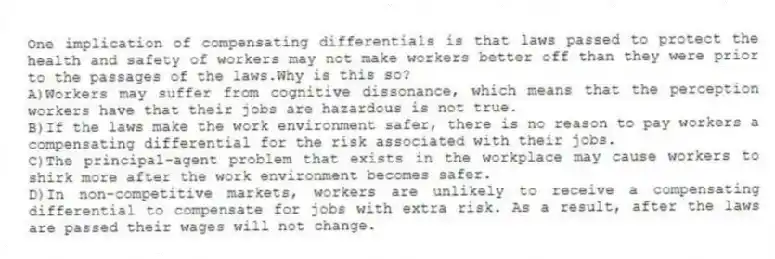
One implication of compensating differentials is that laws passed to protect the health and safety of workers may not make workers better off than they were prior to the passages of the laws.Why is this so?
A) Workers may suffer from cognitive dissonance, which means that the perception workers have that their jobs are hazardous is not true.
B) If the laws make the work environment safer, there is no reason to pay workers a compensating differential for the risk associated with their jobs.
C) The principal-agent problem that exists in the workplace may cause workers to shirk more after the work environment becomes safer.
D) In non-competitive markets, workers are unlikely to receive a compensating differential to compensate for jobs with extra risk. As a result, after the laws are passed their wages will not change.
Correct Answer:
Verified
Q202: Marsha Murphy complained, "Many jobs that are
Q203: In labor economics, the term "customer discrimination"
Q204: Phil Harrison is a welder who works
Q205: According to two economists, George Ackerlof and
Q206: Wage differences can be explained by all
Q208: As nonunion construction workers replace a unionized
Q209: Larry and Mike are equally skilled construction
Q210: Most economists believe that only a small
Q211: Higher wages that compensate workers for unpleasant
Q212: While labor unions tend to negotiate above-equilibrium
Unlock this Answer For Free Now!
View this answer and more for free by performing one of the following actions

Scan the QR code to install the App and get 2 free unlocks

Unlock quizzes for free by uploading documents